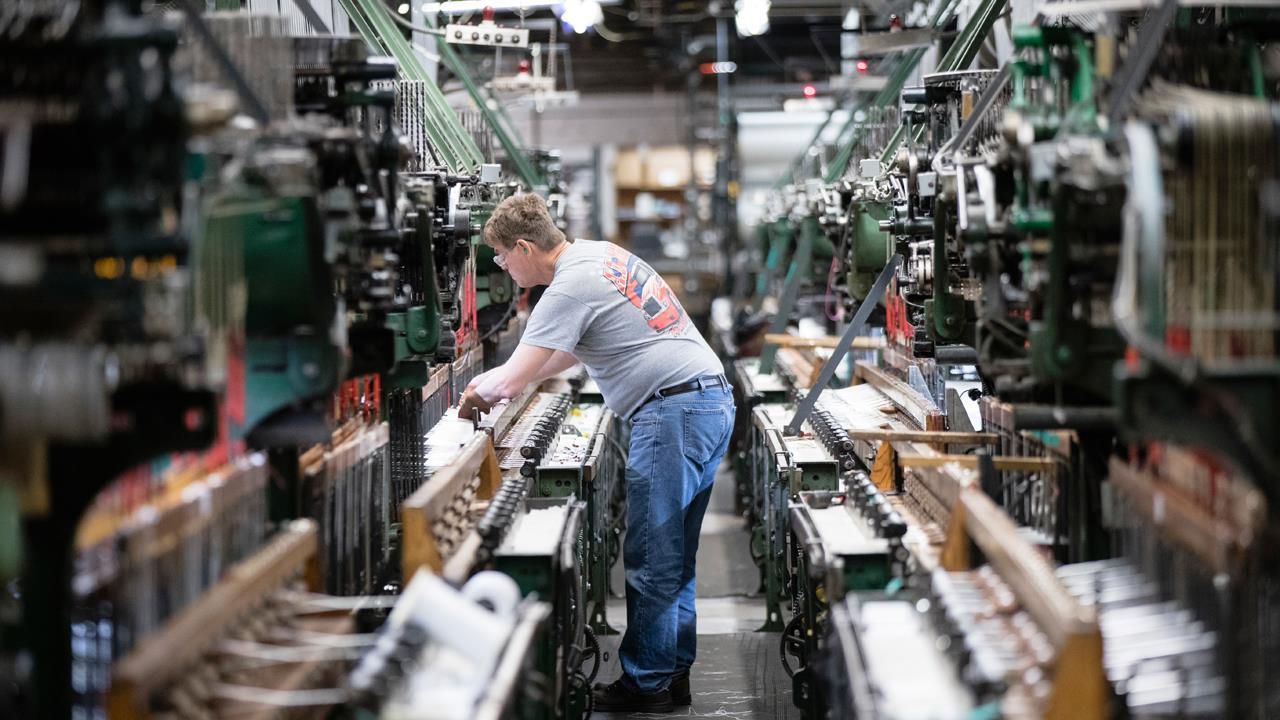The American dream has traditionally been linked to the quest for happiness and financial success. For many, this dream commences with their entry into the workforce as factory employees in the United States. Gainful employment not only ensures the financial obligations are met but also presents avenues for personal development and a stable future. Throughout history, factory employment in the USA has held great importance by offering countless individuals a route to economic stability.
Today, my objective is to delve into the experience of becoming a factory worker in the United States. We will examine the various types of factory worker positions that are accessible and the aspects that connect you with your fellow American factory workers.
Who are factory workers
Before we dive into the discussion of factory workers in the USA, let’s first understand who they are. They are commonly referred to as manufacturing or production workers, depending on their specific industry. You can often find them employed in various manufacturing facilities, spanning from automotive and electronics factories to food processing and textile plants.
The specific job description of a factory worker can vary depending on the sector they work in, with a wide range of roles available. These roles include assemblers, machine operators, quality control inspectors, material handlers, and packers/loaders.
Factory workers in the United States play a vital role in the economy, making this a significant source of employment. According to the U.S. Bureau of Labor Statistics (BLS), as of 2021, there were approximately 12.6 million manufacturing jobs in the US. The manufacturing sector makes a substantial contribution to the nation’s economy and provides opportunities for workers with varying skill levels.
There are several advantages to working as a factory worker in the United States. One of these benefits is the opportunity to earn different wages, depending on factors such as your location, the industry you work in, and your level of experience. On average, manufacturing workers can earn an hourly wage ranging from approximately $20 to $25.
What are the benefits of Factory Workers in the USA?
Factory workers in the USA can enjoy a range of other benefits, including:
- Steady Employment: Factory jobs often offer stable, full-time employment, providing workers with a dependable source of income.
- Health Benefits: Many manufacturing companies provide comprehensive health insurance plans to their employees, ensuring that workers have access to medical care and coverage for themselves and their families.
- Retirement Plans: Some employers offer retirement benefits, which can include 401(k) plans or pensions, helping factory workers prepare for their financial future.
- Career Advancement: Factory workers have the opportunity to advance their careers by gaining experience, acquiring new skills, and taking on more specialized roles within the manufacturing industry. This can lead to higher-paying positions and increased job satisfaction.
- Educational Opportunities: Some employers offer educational assistance or reimbursement programs, allowing factory workers to pursue further education or training. This can help them acquire new skills and qualifications that enhance their career prospects.
These benefits contribute to making factory work in the USA an attractive and rewarding career choice for many individuals.
What is the Job description of a Factory Worker in USA?
Factory workers in the United States perform a variety of tasks on a daily basis, and the specific duties can vary depending on their sector and industry. Here’s an example of a typical factory worker’s job description:
- Operating Machinery: Factory workers often operate machinery and equipment required for the production process. This can include tasks such as setting up, running, and monitoring machines to ensure the manufacturing process runs smoothly.
- Quality Control: Ensuring that products meet quality standards is a crucial part of a factory worker’s role. This may involve inspecting finished products for defects, conducting tests, and making adjustments to maintain quality.
- Assembling and Fabricating: Assemblers and fabricators are responsible for putting together parts and components to create finished products. They follow blueprints, instructions, or technical specifications to assemble items accurately.
- Material Handling: Material handlers play a crucial role in moving raw materials, components, and finished products within the factory. They may use forklifts, conveyor belts, or other equipment to transport items safely and efficiently.
- Safety Procedures: Factory workers must adhere to strict safety protocols to prevent accidents and injuries. This includes wearing appropriate safety gear, following safety guidelines, and being aware of potential hazards in the workplace.
Factory workers are essential to the production process, and their responsibilities may encompass a combination of these tasks, depending on their specific role and the industry they work in.
Skills required for factory workers
To excel as a factory worker in the USA, you’ll need a set of essential skills to stand out and succeed in your role. These skills include:
- Manual Dexterity: Factory work often involves intricate tasks that demand precise hand-eye coordination and skill in handling tools and equipment.
- Attention to Detail: Paying close attention to detail is critical for ensuring the quality and accuracy of products. Identifying and addressing any defects or issues is a vital aspect of the job.
- Communication Skills: Effective communication is essential for collaborating with colleagues, understanding instructions, and maintaining a safe and efficient work environment.
- Problem-Solving Abilities: The ability to troubleshoot and find solutions when challenges arise is valuable in maintaining productivity and product quality.
- Basic Math Skills: Fundamental math skills are necessary for tasks such as measuring, calculating quantities, and following technical instructions accurately.
- Technical Knowledge: Depending on the specific industry and role, having knowledge of the machinery and equipment used in the manufacturing process is beneficial. This knowledge can improve your efficiency and effectiveness on the job.
- Safety Awareness: Safety is a top priority in factory work. Being aware of potential hazards and adhering to safety protocols and guidelines is essential for preventing accidents and maintaining a secure work environment.
Cultivating and refining these skills will not only help you excel as a factory worker but also contribute to a successful and rewarding career in the manufacturing industry in the USA.
Steps to take to become a factory worker in the USA
Becoming a factory worker in the USA, especially as a non-citizen or non-resident, can be a complex process, but by following the steps you’ve outlined, you can increase your chances of landing a factory worker job. Here’s a summary of the steps:
- Education: While a high school diploma or GED is often sufficient for entry-level positions, additional education and vocational training can open doors to more specialized roles. Building relevant skills is crucial.
- Determine Eligibility: Ensure you meet the eligibility criteria, which may include physical fitness requirements for manual labor positions.
- Search for Job Openings: Use online job search platforms and job boards to find factory worker job listings.
- Apply for Jobs: Create a well-structured resume highlighting your skills and education. Submit applications and prepare for interviews to demonstrate your qualifications.
- Work Visa: To work legally in the United States, you’ll generally need a work visa, such as the H-2B visa, which your potential U.S. employer must sponsor.
- Employer Sponsorship: Your employer will need to submit a petition to the U.S. Citizenship and Immigration Services (USCIS) on your behalf, demonstrating their need for your skills and that hiring a foreign worker won’t negatively impact American workers.
- Visa Application: After USCIS approval, apply for a work visa at the U.S. embassy or consulate in your home country. Attend an interview and provide required documents. Once approved, you can work in the U.S. temporarily.
- Travel to the U.S.: With your visa, you can travel to the United States and start your factory worker job.
- Compliance: Be aware of your visa’s terms and conditions, including its duration and limitations on changing employers. Adhere to U.S. immigration and labor laws.
It’s important to note that the U.S. immigration system can be complex and requirements may change, so consulting an immigration attorney or contacting the U.S. Embassy in your home country for specific guidance is recommended.
Conclusion
Becoming a factory worker in the USA can indeed be a stepping stone toward financial security and achieving the American dream, but it does require hard work, determination, and skill development. The industry is competitive, with many individuals seeking these jobs. Building relevant skills and following the outlined steps can help you on your journey to becoming an American factory worker. Good luck, and feel free to share this information with anyone who may find it useful.
Apply for factory Worker jobs here https://www.indeed.com/career/factory-worker/salaries


![Auburn University Scholarships in USA 2024 [Fully Funded]](https://files.topnews.ng/wp-content/uploads/2023/11/auburn-150x150.jpeg)
Wow this is a nice article. Working abroad is a fast means of making money. And working as a factory worker and receiving pension after retirement is awesome
This is nice and a beautiful opportunity to many in need of this opportunity
The benefits seems to be very much appreciated and mouth watering. It will be good to work as in one of the factories over there in USA.
The American dream has traditionally been linked to the quest for happiness and financial success.
Wow, wow l love this, to say the truth, this article is very beautiful, please continue the good work, God will surely bless all the workers
I like the fact that workers have the opportunity to advance their career by gaining experience and acquire new skills
Wow.
It’s great but the processing will be tedious Cox when applying you won’t be told on the payment, it’s once you are done applying but my comments should not dissuade anyone from applying.
Thank you for the enlightening article. The update will be really helpful for many and I must say, the job is worth a try .
This article is beautiful I really want to be seeing this kind of articles it’s really inspiring thanks for sharing
This is a very Nice and enlightening article.
Thank you very much for the update.
This article sound great I pray everything work well as it is been stated in the article.
Quite the promising article but I think it embraces the enlightenment of many people
This is absolutely beautiful and wonderful article .. Thank you for the update…